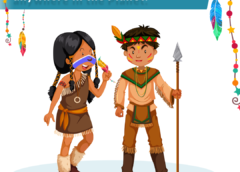Every year on August 9, people around the world celebrate the International Day of the World’s Indigenous People to support and defend their rights. The achievements and efforts of indigenous people to global issues like environmental preservation are also recognized during this occasion.
The UN General Assembly declared it for the first time in December 1994, on the anniversary of the first gathering of the Working Group on Indigenous Populations of the In 1982, there was a subcommission on the advancement and defense of human rights.
The Assembly launched the Second International Decade in 2004 with the slogan “A Decade for Action and Dignity” and ran it from 2005 to 2015. To convey the UN’s message about indigenous peoples, residents from all over the world are urged to take part in the celebration of the day.
To better appreciate and comprehend indigenous peoples, activities also include informative seminars and classroom exercises.
Read Also: Know Everything Why And How Christmas Day Is Celebrated?
Some Information About The Indigenous People
Indigenous Peoples are thought to number 477 million worldwide. They represent around 19% of the extremely poor, although making up only 6% of the world’s population.
Indigenous Peoples frequently face numerous obstacles to fully participating in the formal economy, having access to justice, and becoming involved in political processes and judgment. They frequently lack formal recognition over their lands, territories, and natural resources, are frequently the last to receive public investments in basic services and infrastructure, and frequently receive public investments after other groups.
Indigenous Peoples control 80% of the world’s surviving biodiversity, even though they only own, inhabit, or use a quarter of its landmass. They possess essential ancestral knowledge and skills on how to cope with, lessen, and reduce the hazards of natural disasters.
Due to their reliance on the environment and the resources of the homelands and territories, indigenous peoples face major risks from climate change, deforestation, pollution, development, and biodiversity losses.
Read Also: 6 Food Gifts You Should Bring For New Parents
Indigenous People Situations for Women and Children
Due to discrimination and harassment, indigenous women are less likely to use medical facilities whenever they are pregnant, which increases their risk of giving birth fatalities.
Adolescent Native Indian girls give birth at a frequency that is double that of the broader Guyanese population. San women in Namibia are 10 times more likely to give birth without medical intervention than Maasai women in Kenya, who are twice as probable to have received no prenatal care.
In some nations, Indigenous women experience a disproportionate amount of domestic violence because they are the brunt of the resentment and fury brought on by systemic prejudice that affects the larger community.
Indigenous kids are particularly prone to abuse. Children of the San and other Indigenous peoples in southern Africa have a difficult time getting access to education.
Read Also: World Health Day 2022
Announcement of the Rights of Indigenous Peoples by the United Nations
On September 13, 2007, the General Assembly passed the United Nations Declaration on the Rights of Indigenous Peoples (UNDRIP), which established a global framework of minimum criteria for the survival, dignity, and well-being of all indigenous peoples.
It should serve as the foundation for any discussion on indigenous peoples’ individual and collective rights because it is the most comprehensive report explaining their rights. Indigenous peoples must give their free, prior, and informed consent on areas that are crucial to their rights, survival, dignity, and well-being. The Declaration is currently the most comprehensive international document on the rights of indigenous peoples.
Conclusion
Indigenous Peoples are consistently denied their claim to self-determination, which is a fundamental pillar of international law that relates to the freedom of individuals to choose their political status and to seek their own economic, social, and cultural advancement.
Australian aboriginal children were also put in organizations in which they were abused and neglected while being pressured to adapt to white society. Every year on August 9th, the International Day of the World’s Indigenous Peoples is marked to promote awareness of and defend the rights of the indigenous peoples all over the world.

Leave a Reply
You must be logged in to post a comment.